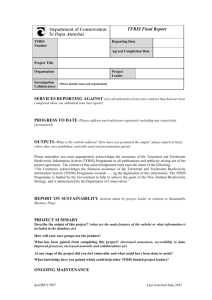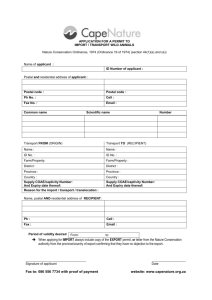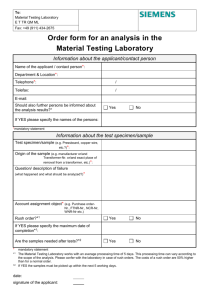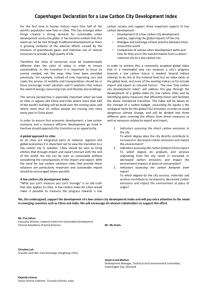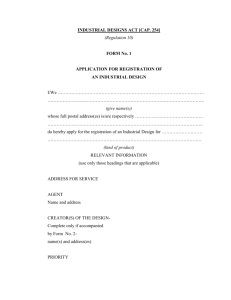Supplementary Form A Non-Commercial - Research
advertisement
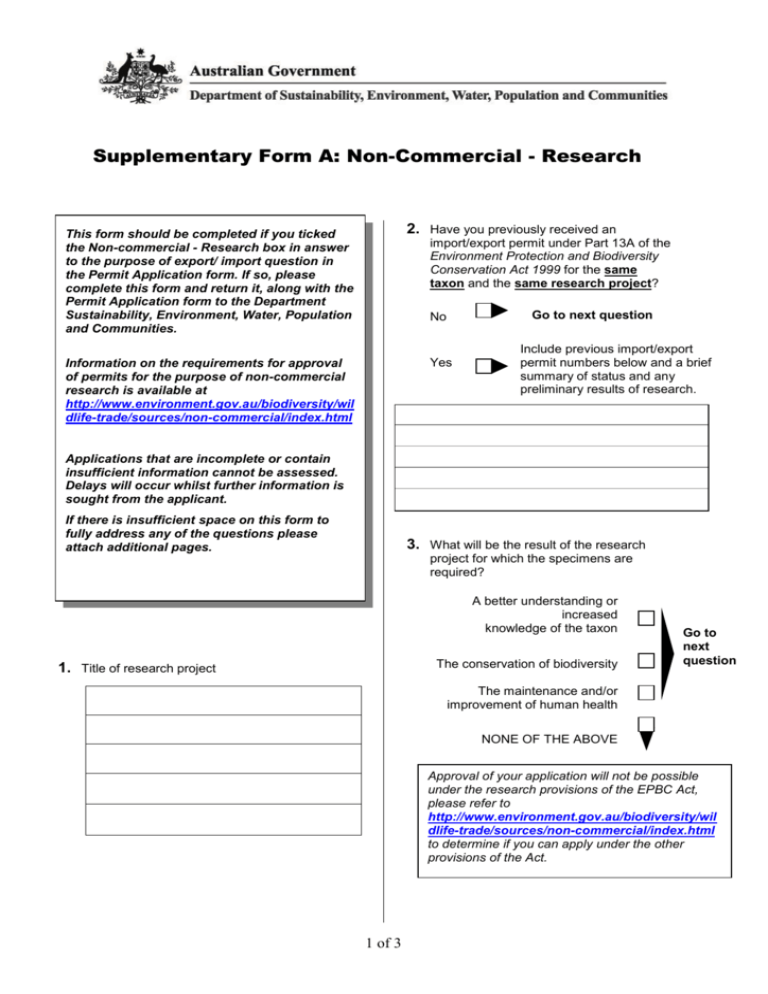
Supplementary Form A: Non-Commercial - Research 2. Have you previously received an This form should be completed if you ticked the Non-commercial - Research box in answer to the purpose of export/ import question in the Permit Application form. If so, please complete this form and return it, along with the Permit Application form to the Department Sustainability, Environment, Water, Population and Communities. import/export permit under Part 13A of the Environment Protection and Biodiversity Conservation Act 1999 for the same taxon and the same research project? Go to next question No Yes Information on the requirements for approval of permits for the purpose of non-commercial research is available at http://www.environment.gov.au/biodiversity/wil dlife-trade/sources/non-commercial/index.html Include previous import/export permit numbers below and a brief summary of status and any preliminary results of research. Applications that are incomplete or contain insufficient information cannot be assessed. Delays will occur whilst further information is sought from the applicant. If there is insufficient space on this form to fully address any of the questions please attach additional pages. 3. What will be the result of the research project for which the specimens are required? A better understanding or increased knowledge of the taxon The conservation of biodiversity 1. Title of research project Go to next question The maintenance and/or improvement of human health NONE OF THE ABOVE Approval of your application will not be possible under the research provisions of the EPBC Act, please refer to http://www.environment.gov.au/biodiversity/wil dlife-trade/sources/non-commercial/index.html to determine if you can apply under the other provisions of the Act. 1 of 3 4. Attach a précis of the proposed research project. Include details of the objectives, methodology and an explanation of how the project will meet the objectives shown in Question 3. institution with sufficient resources or qualifications? Yes Approval of your application will not be possible under the research provisions of the EPBC Act. Please refer to http://www.environment.gov.au/ biodiversity/wildlifetrade/sources/noncommercial/index.html to determine if you can apply under the other provisions of the Act. Attach information that demonstrates this and go to next question Yes the research or as part of the research or when the research is completed.) No 5. Will the research be done by a person or No 8. Will the animal be killed? (Either prior to Go to question 9 Provide evidence that the animal(s) will be killed in a way that is generally accepted to minimise pain and suffering and Go to next question Note: In the case of live vertebrates, evidence should include evidence of animal ethics committee approval (or equivalent). For live invertebrates, include a brief description of how the animals will be killed and refer to any guidelines that will be followed. 9. Provide justification that the number of specimens to be imported or exported is appropriate for the needs of the research. 6. Does the research involve live animal(s)? The research may include activities undertaken prior to the import or export and therefore research may involve a live animal even though the animal is not being imported or exported alive. Some examples of where the research involves a live animal, even though the permit is for a dead specimen: Animals are collected and killed prior to import or export; or Live animals are used in experiments and blood or tissue samples are imported or exported for analysis. No Yes 10. Does the specimen come from a captive animal or artificially propagated plant? The regulations state that if possible, the specimen should come from a captive animal or artificially propagated plant. Go to question 9 Go to next question No 7. Provide evidence that the animal is being, has been and/or will be held in a way that is known to result in minimal stress and risk of injury to the animal. In the case of live vertebrates, this should include evidence of animal ethics committee approval (or equivalent). For invertebrates, include a brief description of how the animals will be kept and handled. Provide the rationale for not using captive animal(s) or artificially propagated plant(s) (use a separate page if necessary) and go to next question Go to next question 2 of 3 Yes 13. Attach copies of any other approvals or permits relating to the specimens Include (where appropriate): 11. Is the specimen from a species listed as Ethics committee approvals State/Territory holding, collection, import and export permits CITES permits threatened (excluding the Conservation Dependant category) under section 178 of the EPBC Act? The list of EPBC threatened species is at http://www.environment.gov.au/biodive rsity/threatened/index.html 14. Declaration I declare that No Go to question 13 Yes Go to next question a) if asked by the Department, I/my organisation will provide written information about the progress and results of the research; b) I/my organisation will publish, or make available for inspection, the results of the research in the country where the research is done; and c) that during and after the research , I/my organisation will not allow the specimen, or progeny or products of the specimen, to be used for commercial purposes. 12. Has a recovery plan been prepared for this species? A list of recovery plans is at: http://www.environment.gov.au/biodive rsity/threatened/recovery-listcommon.html No Go to next question Yes Provide evidence that the export is not inconsistent with any recovery plan and Go to next question Name of applicant or authorised person (if applicant is an organisation) Position within organisation (if applicable) Organisation (if applicable) Signature of applicant or authorised person Date signed 3 of 3
